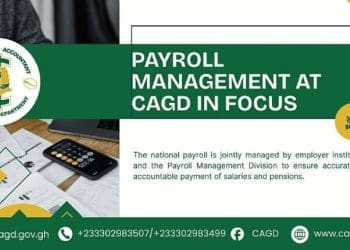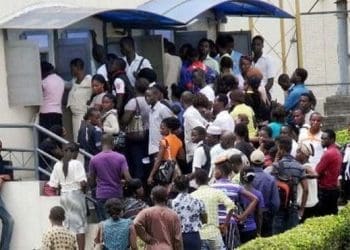Bank of Ghana Governor Dr. Johnson Asiama has said that sustaining the gains made by the cedi will require deeper structural reforms, strategic public-private collaboration, and a cultural shift in how Ghana engages with foreign exchange.
The cedi has reversed nearly all the depreciation suffered in 2022 and 2023, restoring macroeconomic credibility and investor confidence.
Speaking at a media briefing in Accra, he attributed the cedi’s rally to stronger fundamentals, fiscal consolidation, and disciplined monetary policy execution.
“What we are witnessing is the power of synchronised policy execution,” Dr. Asiama declared.
“The central bank’s disinflation stance, paired with the government’s fiscal discipline, has anchored the cedi and stabilised expectations.”
Cedi rallies 42% in 2025
The Cedi has appreciated by more than 42% year-to-date as of June 2025.
$1.4bn foreign exchange intervention
BoG sold an unprecedented $1.4 billion in foreign exchange in the first quarter of 2025 to stabilise the cedi, according to a new report by the International Monetary Fund (IMF).
The forex intervention figure for the second quarter has not been disclosed.
$3bn Forex intervention in 2024
This aggressive market intervention already accounts for nearly half of the total $3 billion the BoG deployed across all of 2024, and far exceeds the $1 billion in interventions made in 2023.
Of the $3 billion injected in 2024, $2 billion was spent in the last quarter, which saw the cedi appreciate from GH₵16 to end the year at GH₵14.70.
GH₵10.40 currently
The BoG’s additional injection of $1.4 billion accelerated the appreciation of the cedi, moving it to GH₵10.40 to the dollar currently.
This represents a year-to-date appreciation of 41.35%.
Indicative open market rates
Indicative open market rates at the close of last week stood at GH₵10.55 to the dollar, GH₵14.36 against the British pound, and GH₵12.43 to the euro.
$11.1bn GIR for 4.8 months of import cover
Ghana’s gross international reserves have risen to $11.1 billion, providing 4.8 months of import cover, up from $8.98 billion at the end of 2024.
This improvement, Dr. Asiama explained, is driven by higher export receipts, resilient remittances, and prudent reserve management.
$4.14bn trade surplus
In the first four months of 2025 alone, Ghana recorded a trade surplus of $4.14 billion.
Gold, cocoa, and oil price hikes power exports by 60%
Exports soared by over 60%, led by robust performances in gold, cocoa, and oil.
$2.12bn in current account
The current account registered a surplus of $2.12 billion in the first quarter, up sharply from just $66 million in the same period last year.
Reserves, trade, and ratings on the rise
These outcomes have not gone unnoticed by global markets.
S&P Global Ratings recently upgraded Ghana’s sovereign rating from Selective Default to CCC+, citing successful IMF programme reviews and renewed fiscal credibility.
“These are more than numbers. They are a vote of confidence in Ghana’s macroeconomic management—confidence that is critical for investor inflows, business expansion, and economic transformation,” Dr. Asiama said.
Monetary discipline and market credibility
The BoG has maintained a tight monetary stance, holding the policy rate at 28%, actively conducting Open Market Operations to mop up excess liquidity, and enforcing strict discipline in the foreign exchange market through forward guidance and structured FX auctions.
These measures have led to a visible recovery in confidence indicators.
The Composite Index of Economic Activity (CIEA) rose by 4.4% year-on-year in May 2025, while the Purchasing Managers’ Index (PMI) is rebounding steadily, reflecting improved business sentiment and consumer optimism.
Portfolio inflows returning
Portfolio inflows are also returning, and investors are regaining confidence in cedi-denominated assets—an outcome Dr. Asiama attributed to the coordinated efforts between the BoG and the Ministry of Finance.
The hard part is sustaining the gains
Despite the positive momentum, the Governor cautioned that the most difficult task lies ahead—sustaining forex gains in a volatile global environment.
“Sustaining forex gains is a far more complex task than achieving them,” he noted. “It requires anticipation, recalibration, and reform.”
The first threat lies in Ghana’s overdependence on a narrow set of commodity exports.
While booming gold prices—currently above $3,200 per ounce due to geopolitical tensions like the Iran-Israel conflict—have boosted earnings, Dr. Asiama warned that a future correction could easily erode trade surpluses.
Additionally, Ghana’s import profile remains skewed towards fuel, capital goods, and essential commodities, which creates seasonal spikes in forex demand, especially in the second half of the year.
Cultural shift needed: Ending dollarisation
A more deeply embedded challenge, according to Dr. Asiama, is behavioural.
The culture of dollarisation remains widespread in Ghana’s economy, with sectors like real estate, private education, and luxury retail pricing goods and services in U.S. dollars, despite operating locally.
“This not only violates legal tender laws,” he said, “but it undermines the legitimacy and stability of the cedi.”
The Governor called for a national cultural reset, urging businesses to conduct transactions in cedis and reinvest forex proceeds locally.
He said the BoG would step up enforcement of legal tender laws and integrate the rollout of the eCedi into retail ecosystems to reinforce the currency’s role in the digital economy.
Export gains must stay in Ghana
Dr. Asiama also emphasised the need for better domestic retention of forex earnings.
Many exporters, especially SMEs and informal sector players, continue to repatriate only limited portions of their revenue, weakening local liquidity.
To address this, the BoG is encouraging policies that incentivise reinvestment, such as linking tax incentives, procurement access, and concessional financing to proof of local value retention.
He also proposed a fintech-forward approach, where SMEs are supported with digital tools to engage in cross-border trade, retain forex through formal channels, and expand the country’s forex base beyond commodities.
Beyond commodities: Diversification is urgent
To reduce Ghana’s vulnerability to commodity cycles, Dr. Asiama called for rapid diversification of the export base.
In cocoa, he urged a scale-up of value-added processing and the export of branded retail products.
In gold, he advocated for in-country refining and domestic bullion storage.
In oil and gas, he pointed to the urgency of investing in petrochemicals and downstream manufacturing.
Beyond raw commodities, the Governor sees untapped potential in non-traditional exports like IT services, digital finance, education, architecture, and the creative arts—all sectors that could generate stable forex, quality jobs, and economic resilience.
Toward a transparent, liquid FX market
Dr. Asiama also outlined plans to improve Ghana’s foreign exchange market infrastructure.
The BoG will expand forward FX auctions and promote the development of basic derivatives—like swaps and forwards—to help businesses hedge against currency risk.
“These are not speculative tools,” he explained. “They are instruments of resilience that reduce panic-driven volatility and deepen financial sophistication.”
Financial institutions and corporates were urged to incorporate forex exposure into their strategic planning, with the Governor insisting that forex risk management should be a board-level priority, not just a finance department concern.
A call for shared ownership of stability
Dr. Asiama concluded his remarks with a strong appeal for collective responsibility.
He said macroeconomic stability is a public good that benefits all and must therefore be co-owned by all stakeholders—regulators, banks, exporters, investors, and the public.
“The Bank of Ghana has played its part,” he said. “But sustaining forex stability cannot be achieved by the central bank alone. It must be embedded in how businesses operate and how citizens engage the financial system.”
He encouraged firms that invoice in cedis or hedge forex exposure to be supported with tailored credit products and FX liquidity.
He also urged media platforms to promote financial literacy and inform responsibly.
Transformation, not just stability
Ultimately, Dr. Asiama reminded the nation that forex stability is a means, not an end.
The real success lies not in the exchange rate figures, but in whether that stability leads to economic transformation.
“We must build a Ghana where the cedi is trusted and dominant, exporters thrive in competitive markets, and monetary stability is matched by real sector dynamism,” he declared.
“Let’s shift from a reactive posture to a proactive partnership—between regulators, businesses, and citizens—to build a sustainable FX ecosystem that works for all.”













